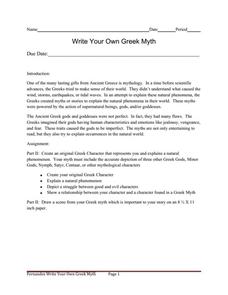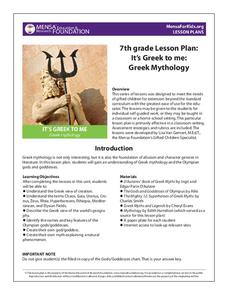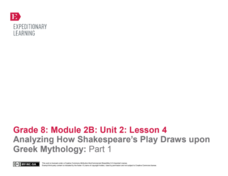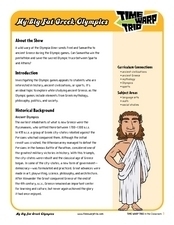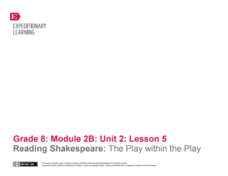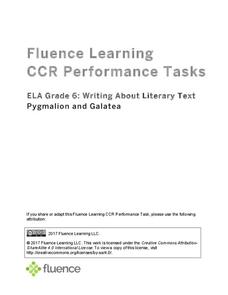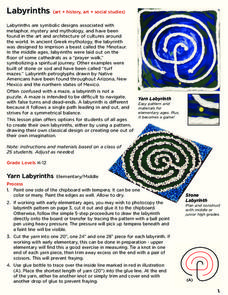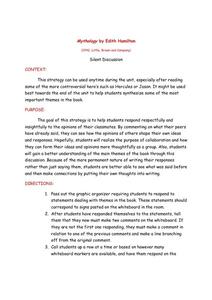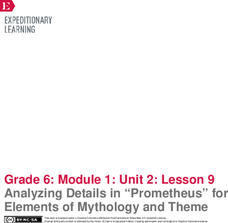Frost Middle School
Write Your Own Greek Myth
Invite your pupils to create original Greek characters and myths for their characters to star in. Similar to a traditional Greek myth, the story must explain a natural phenomenon, depict a struggle between good and evil characters, and...
MENSA Education & Research Foundation
It’s Greek to Me: Greek Mythology
It's no myth: this packet on Greek mythology is an excellent addition to your social studies curriculum. With writing activities, such as short answer responses and biopoems, and reading activities, which include creation stories and...
EngageNY
Analyzing How Shakespeare’s Play Draws upon Greek Mythology: Part 2
Pupils explore the narrative structure of a piece of literary text, mapping out the plot structure of the Greek myth "Pyramus and Thisbe." Next, they use their completed graphic organizers to write story summaries.
School District No. 43
Writing a Greek Myth
Ask your learners to dream up a myth set in modern day. These mythology writing prompts require individuals take on the role of an ancient Greek citizen who just woke up to a totally different world. Through this lens, class members...
Have Fun Teaching
Compare and Contrast Greek Myths (4)
How are Icarus and Prometheus similar? How are they different? Compare any two Greek myths with a graphic organizer, which provides space for kids to fill in the ways that the myths are like and unlike each other.
Prestwick House
Edith Hamilton’s Mythology
Where is the Oracle? Who brought fire from Olympus? What creature is half bird, half horse? Review details from famous Greek myths with a crossword puzzle that focuses on Edith Hamilton's Mythology.
EngageNY
Analyzing How Shakespeare’s Play Draws upon Greek Mythology: Part 1
Scholars read the story "Pyramus and Thisbe," analyzing word choice, tone, and meaning. They then try to find the gist of the story and discuss how Shakespeare used the myth in his play A Midsummer Night's Dream.
EngageNY
Analyzing How Shakespeare’s Play Draws upon Greek Mythology: Part 3
How do the narrative and play versions of the myth "Pyramus and Thisbe" affect meaning? Scholars reread Act 5, Scene 1 from Shakespeare's A Midsummer Night's Dream and compare its structure to "Pyramus and Thisbe." Next, they use a...
Activated Story Theatre
Orpheus- A Greek Myth: Reader's Theatre Script
Is this any way to treat a Greek Myth? By all means, turn the tale of Orpheus into a reader's theatre exercise.
Time Warp Trio
My Big Fat Greek Olympics
The Olympic Games are indeed a significant and far-reaching cultural component in our international community today, but from where do they originate? Where do our traditions stem from, and how do we choose the sports that constitute...
EngageNY
Reading Shakespeare: The Play within the Play
Scholars continue reading the Greek myth "Pyramus and Thisbe," analyzing why it was written into Shakespeare's A Midsummer Night's Dream. Next, they complete a Venn diagram to compare the two texts.
Curated OER
Greek Mythology Character Cubes
Students research Greek myths and identify characters from ancient Greece. After discussing the names, descriptions, scenes an objects in Greek mythology, they draw pictures on tiles and write descriptions. Students join the tiles...
EngageNY
Determining Theme: Reading Myths in “Expert Groups”
Leave it to the experts. Scholars work in expert groups to analyze new myths. Each group is assigned to become an expert on either The
Fates, The Story of Medusa and Athena, or Theseus and the Minotaur. They answer questions and discuss...
Fluence Learning
Writing About Literary Text: Pygmalion and Galatea
Is it crazy to fall in love with your own work, or is that the purest love of all? Compare two renditions of the classic Greek myth Pygmalion and Galatea with a literary analysis exercise. After students compare the similarities and...
Curated OER
Greek Mythology: Cultures and Art
Students examine literary arts. In this Greek mythology lessons, students read Greek myths and select characters from the myths to study. Students create watercolor illustrations of the characters, write short stories about the...
EngageNY
Reading Closely to Build Background Knowledge: “Myths and Legends”
That is a myth! Scholars take a look at Greek myths referenced in The Lightning Thief. As learners listen to stories in Myths and Legends, they imagine the sights and sounds described. Pupils then talk with partners about specific words...
Curated OER
The Legendary Raptors
How are raptors and airplanes alike? Combine science and language arts in this fun and interactive project. Young scientists research the animal in order to design their own aircraft, and compete in a contest for farthest, fastest, and...
Curated OER
Labyrinths
Whether studying metaphors or Greek mythology, this labyrinth project is a fantastic lesson plan to add to your unit. It includes two versions of the labyrinth; making it with yarn or stone. If your materials are limited, you can even...
EngageNY
Exploring Allusions to Myths in The Lightning Thief: Close Reading Part 1 of “Prometheus”
It's all just an allusion. Scholars learn the meaning of allusion and read an allusion in The Lightning Thief. Learners gather in their triads and discuss questions from the text to take a close look at vocabulary words and choose an...
EngageNY
What Makes a Myth a Myth? Comparing “Cronus” and “Shrouded in Myth”
Scholars complete a Venn diagram to compare and contrast Cronus and Shrouded in Myth. Learners work in their triads to write similarities and differences on sticky notes. They then take a look at the text The Key Elements of Mythology to...
Curated OER
Mythology by Edith Hamilton: Silent Discussion
Get everyone up and participating! High schoolers reading Mythology, by Edith Hamilton, complete a graphic organizer independently, and then record one of their thoughts on the white board for a silent discussion. Decide how you're going...
EngageNY
Leaving the Play: All’s Well That Ends Well
How does Shakespeare develop the theme of control in A Midsummer Night's Dream? Using the resource, scholars analyze the theme of parental control in the play and the Greek myth "Pyramus and Thisbe." Next, they talk to partners to...
EngageNY
Mid-Unit Assessment: Author’s Craft: Analyzing Shakespeare’s Craft: Part 2
Annoyed or bewitched—how does an author's word choice affect a text? Scholars begin the instructional activity by analyzing word choice in Shakespeare's A Midsummer Night's Dream. Next, learners take a closer look at the narrative...
EngageNY
Analyzing Details in “Prometheus” for Elements of Mythology and Theme
Well isn't that clever? Scholars read Prometheus, a tale describes the clever Greek god and trickster. They tune into details and complete graphic organizers that reveal the theme of the text.


